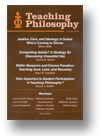|
articles |
|
1.
|
Teaching Philosophy:
Volume >
27 >
Issue: 3
Mitch Avila
Justice, Care, and Ideology in Guess Who’s Coming to Dinner
abstract |
view |
rights & permissions
| cited by
This paper describes how the film “Guess Who’s Coming to Dinner” can be used in the classroom. Drawing on Gilligan’s theory of moral psychology, the paper begins by putting forward a new interpretation of the film. While the central theme of the film is that of miscegenation, another salient topic in the film concerns how to maintain patriarchal privilege in a society that has racial equality. The paper then proceeds to illustrate different ways the film can be used in the classroom, most importantly to illustrate the justice/care distinction. Finally, the pedagogical practice of showing films that support certain ideologies is critically examined.
|
|
|
|
|
2.
|
Teaching Philosophy:
Volume >
27 >
Issue: 3
James B. Gould
Consenting Adults?:
A Strategy for Discussing Unwanted Sex
abstract |
view |
rights & permissions
| cited by
This paper reports on a pedagogical strategy used when discussing consensual and non-consensual sex in college ethics courses. The paper outlines a general teaching technique designed to elicit what students already think about a particular issue and then applies this general technique to the seven specific cases involving unwanted sex. Classroom results on these cases are described, reporting that students tend to adopt two different definitions of what it means for sex to be “consensual”. A commentary on these cases is provided that can be used to encourage students to think through the cases critically, and the author provides a brief commentary on how these cases relate to the notion of autonomy.
|
|
|
|
|
3.
|
Teaching Philosophy:
Volume >
27 >
Issue: 3
Peter R. Costello
Walter Benjamin and Cinema Paradiso:
Teaching Aura, Loss, and Recovery
abstract |
view |
rights & permissions
| cited by
This paper describes how the author teaches Benjamin’s “The Work of Art in the Age of Mechanical Reproduction" by using the 1988 movie “Cinema Paradiso.” The film and Benjamin’s text are used to discuss topics like alienation, the production of meaning in one’s life, and the outmoded nature of concepts like creativity, genius, and eternal value, etc. Whereas students begin by agreeing with the thrust of Benjamin’s text, they end by being in conflict with their strong reaction to the end of “Cinema Paradiso” and the view that aesthetic items like films are merely matters of taste.
|
|
|
|
|
4.
|
Teaching Philosophy:
Volume >
27 >
Issue: 3
Brook J. Sadler
How Important Is Student Participation in Teaching Philosophy?
abstract |
view |
rights & permissions
| cited by
Student participation is essential to philosophy since dialogue is at the center of philosophical activity: it provides students an opportunity to articulate their philosophical ideas, it helps them connect philosophy to their practical experience, it serves as an opportunity for instructors to take an interest in their students’ views, and it promotes intellectual virtues like courage and honesty. However, lectures can serve many of the same functions, albeit in different ways, e.g. a lecturer can engage other historical philosophers so as to illustrate various dialogues in the history of philosophy. This paper argues that both student participation via dialogue and traditional lecturing play important roles in university education and attempts to offer guidance on how to strike a balance between lecture-driven and student-driven instruction.
|
|
|
|
|
reviews |
|
5.
|
Teaching Philosophy:
Volume >
27 >
Issue: 3
Lawrence M. Hinman
Distributive Justice
view |
rights & permissions
| cited by
|
|
|
|
|
6.
|
Teaching Philosophy:
Volume >
27 >
Issue: 3
Michael Goldman
Philosophy & This Actual World:
An Introduction to Practical Philosophical Inquiry
view |
rights & permissions
| cited by
|
|
|
|
|
7.
|
Teaching Philosophy:
Volume >
27 >
Issue: 3
Scott Aikin
Human Knowledge:
Classical and Contemporary Approaches, Third Edition
view |
rights & permissions
| cited by
|
|
|
|
|
8.
|
Teaching Philosophy:
Volume >
27 >
Issue: 3
John R. Wright
Ethical Formation
view |
rights & permissions
| cited by
|
|
|
|
|
9.
|
Teaching Philosophy:
Volume >
27 >
Issue: 3
Laura Newhart
Identities:
Race, Class, Gender, and Nationality
view |
rights & permissions
| cited by
|
|
|
|
|
10.
|
Teaching Philosophy:
Volume >
27 >
Issue: 3
Jeffrey M. Jackson
Friedrich Nietzsche
view |
rights & permissions
| cited by
|
|
|
|
|
11.
|
Teaching Philosophy:
Volume >
27 >
Issue: 3
Laura Hengehold
The Cambridge Companion to Simone de Beauvoir
view |
rights & permissions
| cited by
|
|
|
|
|
12.
|
Teaching Philosophy:
Volume >
27 >
Issue: 3
Robert L. Perkins
Kierkegaard’s Upbuilding Discourses:
Philosophy, Literature, Theology
view |
rights & permissions
| cited by
|
|
|
|
|
13.
|
Teaching Philosophy:
Volume >
27 >
Issue: 3
William Wians
Shakespeare’s Tragic Skepticism
view |
rights & permissions
| cited by
|
|
|
|
|
14.
|
Teaching Philosophy:
Volume >
27 >
Issue: 3
Charles Courtney
The Philosophical Athlete
view |
rights & permissions
| cited by
|
|
|
|
